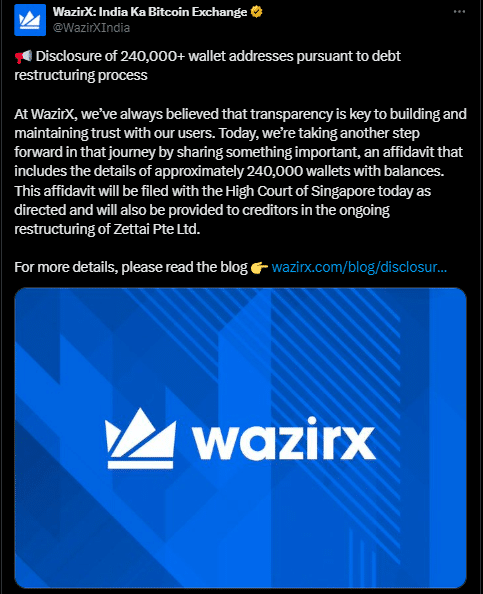As a seasoned crypto investor with over a decade of experience navigating the digital asset landscape, I have seen my fair share of twists and turns. The recent revelation by WazirX regarding the disclosure of 240,000 users’ wallet addresses leaves me, at best, apprehensive about the situation.
On Thursday, WazirX exchange officials disclosed their intention to unveil the account details of approximately 240,000 users’ digital wallets in an affidavit submitted to the Singapore High Court. They stated that this move is aimed at promoting transparency following the Rs 2000 crore hack. However, it appears this decision was made in response to a directive from the Singapore court, mandating them to disclose the wallet addresses.
The court in Singapore required the public disclosure of WazirX wallet addresses as one of the terms for granting a four-month halt to Zettai Pte Ltd, which is the parent company of WazirX.
Although the platform asserts that this action was voluntary and a demonstration of their dedication towards fostering trust, numerous users and prominent figures within the cryptocurrency sector are expressing doubt.

Some critics suggest that the large quantity of wallet addresses mentioned thus far may raise questions among users as to whether this emphasis on transparency is genuine or merely a response to increasing legal demands due to growing scrutiny.
One Twitter user expressed rage stating, “WazirX kept 235 million in 1 wallet and now they are saying the remaining 55% funds are spread across 240,000 wallets.”
He added, “This is some next level FRAUD & MANIPULATION.”
The numbers are staggering. WazirX claims to manage over 4.3 million users’ wallets, but the revelation that 240,000 wallet addresses still hold user balances has sparked concerns over the platform’s ability to manage such a complex system.
WazirX’s argument centers on the intricacy and duration involved in sweeping these wallets, pointing out that expensive network fees are causing delays. They advocate for a careful strategy to prevent excessive charges and to guarantee the most efficient return of users’ assets.
For numerous individuals within the cryptocurrency community, this explanation doesn’t seem to boost trust. Instead, they are seeking clarification: Could the issue be more about transaction fees rather than a cover for hidden management problems and delayed responsibility?
Read More
- Gold Rate Forecast
- How Angel Studios Is Spreading the Gospel of “Faith-Friendly” Cinema
- Comparing the Switch 2’s Battery Life to Other Handheld Consoles
- EUR CNY PREDICTION
- Hero Tale best builds – One for melee, one for ranged characters
- Castle Duels tier list – Best Legendary and Epic cards
- Mini Heroes Magic Throne tier list
- Why The Final Destination 4 Title Sequence Is Actually Brilliant Despite The Movie’s Flaws
- Jerry Trainor Details How He Went “Nuclear” to Land Crazy Steve Role on ‘Drake & Josh’
- EUR NZD PREDICTION
2024-10-17 15:03